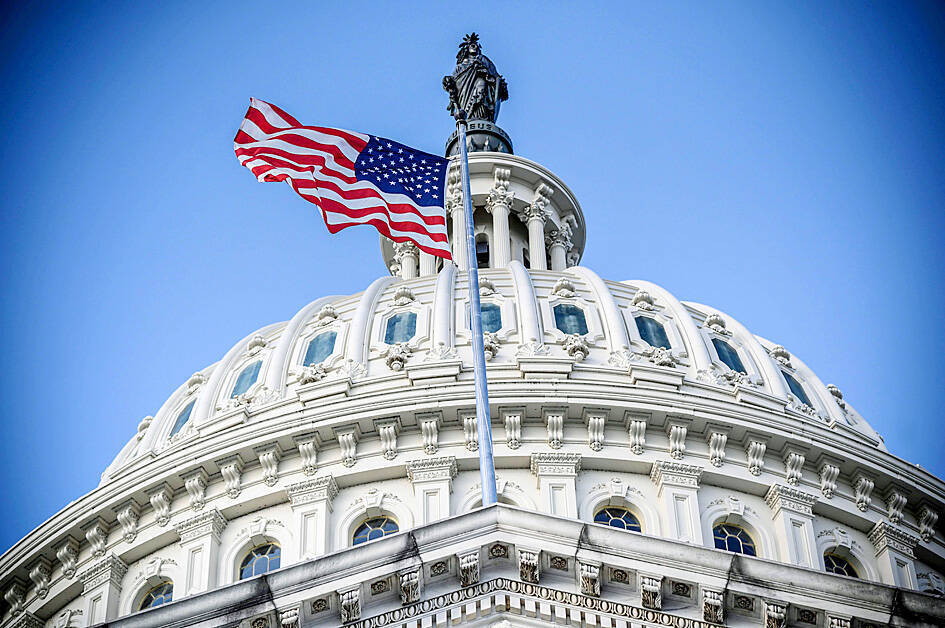UN Resolution 2758 did not address Taiwan’s representation in the UN, the Taiwan International Solidarity Act passed by the US House of Representatives Foreign Affairs Committee says.
The bill was introduced in the US House of Representatives in February to amend the Taiwan Allies International Protection and Enhancement Initiative (TAIPEI) Act of 2019.

Photo: AP
The amendment was passed by the committee with a voice vote without objection and would be sent to the House of Representatives for consideration.

Photo: AFP
The bipartisan TAIPEI Act was introduced in the US Congress in 2019 and signed into law in 2020 to “express United States support for Taiwan’s diplomatic alliances around the world.”
It requires the US to advocate for Taiwan’s membership in international organizations and support the nation to bolster diplomatic ties with countries around the world.
The amendment includes new paragraphs calling on the US, as a member of any international organizations, to “oppose any attempts by the People’s Republic of China to resolve Taiwan’s status by distorting the decisions, language, policies, or procedures of the organization, and for other purposes.”
UN General Assembly Resolution 2758 established the representatives of the government of China as the only lawful representatives of China to the UN, the amended bill says.
“The resolution did not address the issue of representation of Taiwan and its people in the United Nations or any related organizations, nor did the resolution take a position on the relationship between the People’s Republic of China and Taiwan or include any statement pertaining to Taiwan’s sovereignty,” it adds.
Beijing interpreted the resolution adopted in 1971 to exclude Taiwan from international organizations and their affiliates.
In the resolution, the UN General Assembly decided to “expel forthwith the representatives of Chiang Kai-shek (蔣介石) from the place which they unlawfully occupy at the United Nations and in all the organizations related to it.”
The amendment also reiterates that the US “opposes any initiative that seeks to change Taiwan’s status without the consent of the people.”
In Taipei, the Ministry of Foreign Affairs yesterday thanked the US Congress for its bipartisan support of Taiwan’s participation in international organizations.
Passing the bill ahead of the 76th World Health Assembly, which is to begin this weekend, is especially meaningful, the ministry said.
Taiwan has not received an invitation to attend the meeting of the top decisionmaking body of the WHO for the sixth consecutive year due to pressure by China.
US representatives Michael McCaul, who chairs the committee, and Gregory Meeks, its former chairman, backed the bill, saying that excluding Taiwan from the UN system would be a disservice to the world, the ministry said.
Additional reporting by CNA

A Ministry of Foreign Affairs official yesterday said that a delegation that visited China for an APEC meeting did not receive any kind of treatment that downgraded Taiwan’s sovereignty. Department of International Organizations Director-General Jonathan Sun (孫儉元) said that he and a group of ministry officials visited Shenzhen, China, to attend the APEC Informal Senior Officials’ Meeting last month. The trip went “smoothly and safely” for all Taiwanese delegates, as the Chinese side arranged the trip in accordance with long-standing practices, Sun said at the ministry’s weekly briefing. The Taiwanese group did not encounter any political suppression, he said. Sun made the remarks when

The Taiwanese passport ranked 33rd in a global listing of passports by convenience this month, rising three places from last month’s ranking, but matching its position in January last year. The Henley Passport Index, an international ranking of passports by the number of designations its holder can travel to without a visa, showed that the Taiwan passport enables holders to travel to 139 countries and territories without a visa. Singapore’s passport was ranked the most powerful with visa-free access to 192 destinations out of 227, according to the index published on Tuesday by UK-based migration investment consultancy firm Henley and Partners. Japan’s and

BROAD AGREEMENT: The two are nearing a trade deal to reduce Taiwan’s tariff to 15% and a commitment for TSMC to build five more fabs, a ‘New York Times’ report said Taiwan and the US have reached a broad consensus on a trade deal, the Executive Yuan’s Office of Trade Negotiations said yesterday, after a report said that Washington is set to reduce Taiwan’s tariff rate to 15 percent. The New York Times on Monday reported that the two nations are nearing a trade deal to reduce Taiwan’s tariff rate to 15 percent and commit Taiwan Semiconductor Manufacturing Co (TSMC, 台積電) to building at least five more facilities in the US. “The agreement, which has been under negotiation for months, is being legally scrubbed and could be announced this month,” the paper said,

Japan and the Philippines yesterday signed a defense pact that would allow the tax-free provision of ammunition, fuel, food and other necessities when their forces stage joint training to boost deterrence against China’s growing aggression in the region and to bolster their preparation for natural disasters. Japan has faced increasing political, trade and security tensions with China, which was angered by Japanese Prime Minister Sanae Takaichi’s remark that a Chinese attack on Taiwan would be a survival-threatening situation for Japan, triggering a military response. Japan and the Philippines have also had separate territorial conflicts with Beijing in the East and South China